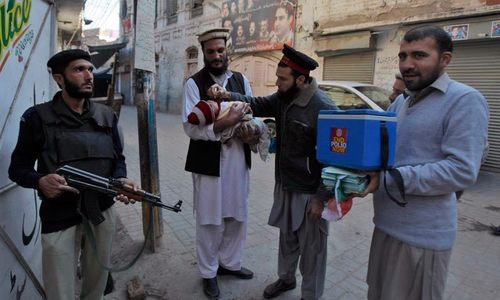Every time the health department carries out an immunisation campaign, Sumaira Ahmed goes door-to-door in the densely populated localities of Rawalpindi to vaccinate children against the poliovirus.
Amid insecurity triggered by recurring attacks on polio workers in other parts of the country, the 24-year-old health worker and two of her colleagues worked from dawn to dusk as part of a recent five-day polio vaccination campaign in the city.
On Tuesday, the first day of a vaccination drive held between Feb 13 and Feb 17, the health workers began the day with a meeting at the union council office, where they were given their vaccination targets and an area supervisor divided the specified area between groups of two to three workers.
The vaccinators checked the poliovirus vaccine and organised the paperwork that would be filled with data of vaccinated children and handed over to the area in-charge on a daily basis. Health workers are also trained to check the vaccine to see whether it has been stored at the right temperature.

“Many people are good, but some objected and we had to convince them that [the vaccine] would protect their children from the crippling disease. In the downtown area, most people are aware and allow their children to be vaccinated,” Ms Ahmed explained.
But problems did sometimes occur during door-to-door visits. In those cases, she said, they informed area supervisors and in-charges, who in turn involved local politicians, influential figures and local prayer leaders.

Mehreen Akhter, a volunteer health worker, said that most people asked to see their cards, to prove that they were “real health workers”. In the city area, people also asked questions about the vaccine.
“There is no need for police in the city area,” said Malik Muzamil, the area in-charge for union council 44. He added that they did provide police personnel to teams in areas where they had had difficulty in the past.

Health workers who asked not to be named also told Dawn they are not paid well, receiving just Rs1,900 for a five-day drive during which they spend the whole day working.
Health workers include volunteers and government officials, lady health workers and anti-dengue sanitary patrols.
District Health Officer Dr Amir Sheikh told Dawn the polio vaccination campaign was scheduled for Feb 12 to Feb 16, and aimed to vaccinate 840,000 children below the age of five.
The drive was pushed ahead by a day due to heavy rainfall on Monday.

A total of 221 union council medical officers and 496 area in-charges have been appointed, 2,333 mobile teams and 287 fixed and 119 transit points have been established, he added.
There are 2,739 teams designated for the campaign, which will be monitored by the health officer, and security for polio workers has been arranged as well.
Dr Sheikh added that vaccination refusals were not a problem in the city, where residents were more aware of the need for vaccinations. He said vaccination targets for the city have been met in every campaign, which was why no polio cases had been reported there for several years.
An environmental sample collected from Rawalpindi tested positive for the poliovirus in January this year.
Published in Dawn, February 18th, 2018

















































Dear visitor, the comments section is undergoing an overhaul and will return soon.